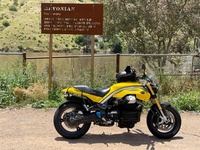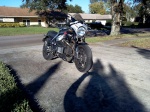| | First Service |  |
|
+4Pete Roper Peaceman Oz1200Guzzi Jhtjon 8 posters |
| Author | Message |
|---|
Jhtjon
Carlotto


Posts : 47
Join date : 2015-12-19
Age : 49
 |  Subject: First Service Subject: First Service  Thu Jul 07, 2016 4:42 pm Thu Jul 07, 2016 4:42 pm | |
| So I just picked up my bike from my dealer, had the full first service done. Bike runs great. On an interesting note the dealer put 20-50 in the engine. Told me he's been doing it on all the MGs. I know the book calls for 10-60. I also know the triumph calls for 15-50 in my thruxton and I've run 20-50 in that for 35000 hard miles with no issues at all in fact I haven't even had a valve go out of spec on that bike.
Should I complain and to who at this point. | |
|
  | |
Oz1200Guzzi
Don Abbondio


Posts : 6086
Join date : 2014-03-13
Age : 69
 |  Subject: Re: First Service Subject: Re: First Service  Thu Jul 07, 2016 4:50 pm Thu Jul 07, 2016 4:50 pm | |
| 10W60 is specified for a reason. Those that know can elucidate on why...
This may be alright on the older bike (LM, SP, G, T etc) but... | |
|
  | |
Peaceman
Tanabuso


Posts : 78
Join date : 2014-07-04
 |  Subject: Re: First Service Subject: Re: First Service  Thu Jul 07, 2016 7:18 pm Thu Jul 07, 2016 7:18 pm | |
| I have to look up what elucidate means... | |
|
  | |
Oz1200Guzzi
Don Abbondio


Posts : 6086
Join date : 2014-03-13
Age : 69
 |  Subject: Re: First Service Subject: Re: First Service  Thu Jul 07, 2016 7:27 pm Thu Jul 07, 2016 7:27 pm | |
| elucidate
ɪˈl(j)uːsɪdeɪt/Submit
verb
make (something) clear; explain.
"work such as theirs will help to elucidate this matter"
synonyms: explain, make clear, make plain, illuminate, throw/shed light on, clarify; | |
|
  | |
Peaceman
Tanabuso


Posts : 78
Join date : 2014-07-04
 |  Subject: Re: First Service Subject: Re: First Service  Thu Jul 07, 2016 7:30 pm Thu Jul 07, 2016 7:30 pm | |
| | |
|
  | |
Pete Roper
GRiSO Capo


Posts : 10711
Join date : 2013-05-29
Age : 67
 |  Subject: Re: First Service Subject: Re: First Service  Thu Jul 07, 2016 7:40 pm Thu Jul 07, 2016 7:40 pm | |
| Is it a mineral or full ester synth? A mineral will degrade very quickly in hot weather especially. There is this weird dichotomy in that although the motor is generally grossly over cooled due to the cooling circuit not being thermostatically controlled the oil is flash heated to extreme levels in the cooling galleries around the exhaust valve seats and when sprayed on the underside of the piston crowns.
The actual viscosity is less of an issue than the ability of the oil to withstand this momentary extreme heat. A mineral oil simply won't cut the mustard. In very hot conditions the upper VI rating will also help give added protection against boundary lubrication events.
Pete | |
|
  | |
Oz1200Guzzi
Don Abbondio


Posts : 6086
Join date : 2014-03-13
Age : 69
 |  Subject: Re: First Service Subject: Re: First Service  Thu Jul 07, 2016 9:05 pm Thu Jul 07, 2016 9:05 pm | |
| This is what I was talking about - thanks Pete. | |
|
  | |
paulbrice
GRiSO Capo


Posts : 1532
Join date : 2015-01-04
Age : 63
 |  Subject: Re: First Service Subject: Re: First Service  Fri Jul 08, 2016 1:11 am Fri Jul 08, 2016 1:11 am | |
| 100% with Pete's point on the viscometrics and oxidation resistance being worse for 20W50 (SAE J300) as they are almost always full mineral baseoil. Would add that the additive packages (that drive the engine wear and performance specs) are also generally weak in 20W50 formulations and won't protect your engine from accumulated deposits/lacquer/wear/volatility losses unless you change it much more frequently than the recommended. In my GRiSO handbook it states CCMC G4/API SG as a min. and CCMC out-of-date (now ACEA) and you can get better - and without wet multi-plate clutch you can put these in no worries.
In UK 20W50s are mainly sold for classic and vintage cars with fond memory pictures and in vintage tins with vintage or no performance specifications beyond viscosity (SAE J300). Vintage (mineral) oils usually used because 'vintage' oil seals tend to shrink and crack in the presence of synthetics, and also they hold higher viscosity at low temperature which is often associated with less slow leaks through dodgy gaskets and tolerances. Vintage car engines are also generally not as high temperature or stressful in terms oil oxidation/wear (unless they have turbos) and they are all almost all water cooled (the VW air cooled boxer engine test started the march to synthetics & better additives !).
I would go SAE J300 10W60 and highest (gasoline) performance spec you can get. I use Mobil 1. | |
|
  | |
Jhtjon
Carlotto


Posts : 47
Join date : 2015-12-19
Age : 49
 |  Subject: Re: First Service Subject: Re: First Service  Fri Jul 08, 2016 4:07 am Fri Jul 08, 2016 4:07 am | |
| | |
|
  | |
paulbrice
GRiSO Capo


Posts : 1532
Join date : 2015-01-04
Age : 63
 |  Subject: Re: First Service Subject: Re: First Service  Fri Jul 08, 2016 1:14 pm Fri Jul 08, 2016 1:14 pm | |
| In that case all good assuming quality specs are up there - must be ester based (things moved on since I was formulating crankcase oils with PAO and just splash of ester for seals) as you can't actually make a 20W50 with full PAO. | |
|
  | |
beetle
GRiSO Capo


Posts : 10200
Join date : 2013-09-30
 |  Subject: Re: First Service Subject: Re: First Service  Fri Jul 08, 2016 2:30 pm Fri Jul 08, 2016 2:30 pm | |
| Hey Paul, can you repeat all that in 'dummy' for those of us who aren't chemical engineers?   . --- --- --- --- --- --- --- --- --- --- --- --- --- --- --- --- --- --- --- --- --- --- --- --- ..[You must be registered and logged in to see this image.].In GRiSO we trust! . | |
|
  | |
paulbrice
GRiSO Capo


Posts : 1532
Join date : 2015-01-04
Age : 63
 |  Subject: Re: First Service Subject: Re: First Service  Sat Jul 09, 2016 10:39 am Sat Jul 09, 2016 10:39 am | |
| Sure - the oil consists of an additive package to meet engine performance specs, a polymer viscosity modifier to meet J300 viscometrics, and mainly (80% wt +) a base oil mixture to provide the underlying lubrication.
Originally all base oils were made from distillates of crude oil and refined to remove things that caused issues in vehicles (remove multi-ring aromatics that cause deposits when heated/oxidised/attacked by combustion products; remove heavy waxes that cause oil to go solid at low temperature); try not to remove too much natural positive natural components that provide anti-wear and anti-oxidation . These are called mineral oil base oils and have a natural mix of aromatics, waxes, etc. They have relatively poor viscosity index so need lower base viscosities and extra additive polymer to make 'wide' multi-grades - this also means they have poor volatility (light ends evaporate in engine). They also have relatively poor oxidation performance so degrade easily in extreme conditions - early saab turbo failures proved minerals too weak in extreme conditions!. BUT their natural aromatics content meant they were sympathetic to oil seals because they didn't 'leach out' the aromatics in the seals that provide the flexibility and volume.
To resolve volatility issues (VW boxer was terrible at boiling oil off), and turbo and other heat/oxidation degradation in modern engines (tighter piston crown lands, design changes etc) industry went to new base oils that were much more resistant to thermal degradation/oxidation.
Two parallel themes were hydrocracked base oils and full synthetics. Hydrocracked base oils are made in refinery by hydrogenating the aromatics and other components that were prone to degrade mineral baseoils in engines. These base oils got better viscosity index at same time so they simultaneously addressed both the volatility and the degradation problem. They retained enough crude oil aromatics to not attack seals too much (bear in mind seals development and testing lagged some of the base oil developments). Full synthetics went to Poly-alpha-olefins (PAO) made from 'pure' building blocks a long way down crude processing line. These are absolutely thermally stable and tight composition and because they are pure 'wax/paraffin type' they have fantastic viscosity index so really address volatility and the thermal/oxidation issues. Sadly since they contain no aromatics they have somewhat worse lubrication properties, reduce the solubility of the additives and other combustion side products and they leach the aromatics from seals and make them shrink and crack - result was development in seal technology to make them more resistant BUT also by adding in esters you could offset the aromatic leaching and buy back both solubility and lubrication. Esters are the second thread of synthetics. They are more expensive than PAO but have some better properties; but some down sides. In past (I stopped formulating engine oils 15 years ago :-() PAO and hydrocracked baseoils were winning the fight and I still think these are more commercially viable approaches.
| |
|
  | |
beetle
GRiSO Capo


Posts : 10200
Join date : 2013-09-30
 |  Subject: Re: First Service Subject: Re: First Service  Sat Jul 09, 2016 2:44 pm Sat Jul 09, 2016 2:44 pm | |
| Chemistry be the divil's work, I sez.  . --- --- --- --- --- --- --- --- --- --- --- --- --- --- --- --- --- --- --- --- --- --- --- --- ..[You must be registered and logged in to see this image.].In GRiSO we trust! . | |
|
  | |
Grisonut
GRiSO


Posts : 1406
Join date : 2014-01-02
 |  Subject: Re: First Service Subject: Re: First Service  Sat Jul 09, 2016 8:06 pm Sat Jul 09, 2016 8:06 pm | |
| As long it's at least SG rated, which means higher zinc countenance, I'll trust that as Paul confused the shit out of me. lol. He probably read books with titles that I wouldn't even understand!   | |
|
  | |
Omnis
GRiSO Capo


Posts : 286
Join date : 2014-10-06
 |  Subject: Re: First Service Subject: Re: First Service  Sun Jul 10, 2016 5:38 am Sun Jul 10, 2016 5:38 am | |
| The net of it is that the only 10w60 I can find in Toronto is the Motul, Agip (rare and extortionately expensive) and Castrol (TWS from BMW). Is the Castrol TWS (10w60) acceptable for the GRiSO? | |
|
  | |
paulbrice
GRiSO Capo


Posts : 1532
Join date : 2015-01-04
Age : 63
 |  Subject: Re: First Service Subject: Re: First Service  Sun Jul 10, 2016 8:09 am Sun Jul 10, 2016 8:09 am | |
| 10W60 is 'just' the viscosity/operating conditions range spec. Anything that says 10W60 is correct and meets MG spec.
10W means it will crank and flow into pick up at -20C; you would go to 5W if you expect to operate at -25C; ....BTW 20W should never go below -10C as potentially the engine will crank & fire but the oil 'may not' 'flow' into the pick up and oil starvation will kill engine (many field examples of engines failing at low temperature due to this effect !)
60 means the 100C viscosity & the high temperature high shear regime viscosity meets or exceeds J300 spec and higher numbers generally mean better protection in severe (temperature & shear of moving metal bits) conditions. Mild engines (coolant controlled temperatures, low shear running gear due to speed or design) can run down to 30 grade and take fuel economy/emission benefits.
The engine performance is a completely different set of specs that are met by running standard bench engine and rig tests followed by strip down and rating against limits. Higher the specs, more likely the oil will prevent deposits/wear/etc. You need to check that any oil meets/exceeds the MG specs in your service manual & don't eg stick in a diesel oil because the additive package has been formulated to address different problems/conditions. I haven't read any books; this used to be my job to develop engine oils :-) | |
|
  | |
Grisonut
GRiSO


Posts : 1406
Join date : 2014-01-02
 |  Subject: Re: First Service Subject: Re: First Service  Sun Jul 10, 2016 11:52 am Sun Jul 10, 2016 11:52 am | |
| - Omnis wrote:
- The net of it is that the only 10w60 I can find in Toronto is the Motul, Agip (rare and extortionately expensive) and Castrol (TWS from BMW). Is the Castrol TWS (10w60) acceptable for the GRiSO?
I wouldn't use the Castrol TWS because it's not SG rated and you want that rating because you need the Zinc in the oil especially with the flat tapped but the point is mute on that since it will fail regardless for other reasons. Folks with classic cars were wondering why their engine started to fail (especially the valve train) in the 90s and they realized that the EPA asswipes forced the oil Industry to get rid of almost all zinc contains in automotive oils. But they forgot to apply that rule to motorcycle oil and that's what I used in my classic Cougar and still do. Since then, I have a stroked roller engine in the car so it's not an issue if I was to use modern specs oil but I don't. Oh, and I use the Motul 7100 10/60 in both Grisos. | |
|
  | |
Pete Roper
GRiSO Capo


Posts : 10711
Join date : 2013-05-29
Age : 67
 |  Subject: Re: First Service Subject: Re: First Service  Sun Jul 10, 2016 2:34 pm Sun Jul 10, 2016 2:34 pm | |
| Sorry, the ZDDP argument with DLC tappets is a red herring. In some cases it can be counter productive but it won't save flat tappets in the 8V.
Pete | |
|
  | |
Peaceman
Tanabuso


Posts : 78
Join date : 2014-07-04
 |  Subject: Re: First Service Subject: Re: First Service  Sun Jul 10, 2016 8:27 pm Sun Jul 10, 2016 8:27 pm | |
| This is awesome info but I need some elucidation on what a "boundary lubrication event" is...still learning and always will be.
Swingarm bearing service soon...standby for questions.. | |
|
  | |
Pete Roper
GRiSO Capo


Posts : 10711
Join date : 2013-05-29
Age : 67
 |  Subject: Re: First Service Subject: Re: First Service  Sun Jul 10, 2016 8:40 pm Sun Jul 10, 2016 8:40 pm | |
| Boundary lubrication occurs when the oil film in the bearing can no longer form a hydrodynamic wedge to keep the two bearing surfaces apart. They then start rubbing together. When you work out the speeds of the two surfaces in relation to each other you soon realise that the bearing materials aren't going to last very long.....
Pete | |
|
  | |
Peaceman
Tanabuso


Posts : 78
Join date : 2014-07-04
 |  Subject: Re: First Service Subject: Re: First Service  Sun Jul 10, 2016 8:54 pm Sun Jul 10, 2016 8:54 pm | |
| | |
|
  | |
Peaceman
Tanabuso


Posts : 78
Join date : 2014-07-04
 |  Subject: Re: First Service Subject: Re: First Service  Mon Jul 11, 2016 4:11 pm Mon Jul 11, 2016 4:11 pm | |
| On the topic of lubrication...I almost have evrything I need to do the swingarms bearings on my Stelvio, while grease for the bearings is fairly obvious this job will also expose the spline gear at the arse end of the shaft deive and I assume a bit of Moly grease should be applied since I have it apart? Local hardware store has 3-5% Moly grease, is this adequate or do I need something with a higher Moly content? Honda used to make a Moly 60 but its been discontinued and they have something called M77 but its not the same.
Suggestions appreciated.
Tom | |
|
  | |
Pete Roper
GRiSO Capo


Posts : 10711
Join date : 2013-05-29
Age : 67
 |  Subject: Re: First Service Subject: Re: First Service  Mon Jul 11, 2016 5:09 pm Mon Jul 11, 2016 5:09 pm | |
| Any old grease will do. The purpose of it is to exclude air and prevent oxidisation, not to lubricate per-se.
Pete | |
|
  | |
Peaceman
Tanabuso


Posts : 78
Join date : 2014-07-04
 |  Subject: Re: First Service Subject: Re: First Service  Mon Jul 11, 2016 5:26 pm Mon Jul 11, 2016 5:26 pm | |
| Thanks Pete. Keep it simple works for me. | |
|
  | |
Grisonut
GRiSO


Posts : 1406
Join date : 2014-01-02
 |  Subject: Re: First Service Subject: Re: First Service  Tue Jul 12, 2016 6:23 pm Tue Jul 12, 2016 6:23 pm | |
| - Pete Roper wrote:
- Sorry, the ZDDP argument with DLC tappets is a red herring. In some cases it can be counter productive but it won't save flat tappets in the 8V.
Pete I agree and that's why I said that the point was mute (actually moot) with the 8V flat tappet. I should have phrased it differently, sorry. | |
|
  | |
Sponsored content
 |  Subject: Re: First Service Subject: Re: First Service  | |
| |
|
  | |
| | First Service |  |
|


